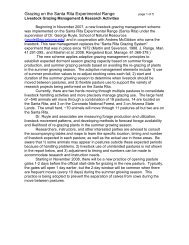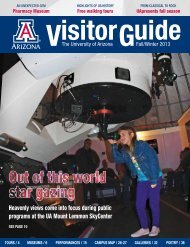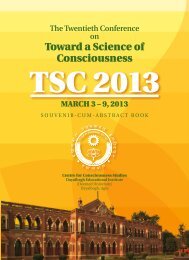CONSCIOUSNESS
Download - Center for Consciousness Studies - University of Arizona
Download - Center for Consciousness Studies - University of Arizona
- No tags were found...
Create successful ePaper yourself
Turn your PDF publications into a flip-book with our unique Google optimized e-Paper software.
130 3. Cognitive Sciences and Psychology<br />
response to sociopolitical pressures over the centuries. The aforementioned constituent features<br />
have increased, especially during the 1800s, to accommodate growing social complexity<br />
(larger demographic units, more social roles, steeper hierarchies, techno-scientific advances<br />
demanding a more focused ‘mind’s eye,’ etc.). By understanding the historical emergence of<br />
the unconscious, then, we are able to delineate the nature of consciousness. C20<br />
175 The Implications of Considering the Mind from the Inside Out Jonathan W.<br />
Schooler (Department of Psychology, University of California,<br />
Santa Barbara, CA)<br />
Historically science has treated minds like all other domains of inquiry- as material objects.<br />
Although the objectification of the mind has led to many important scientific advances,<br />
it has also contributed to a number of conceptual, methodological, and ontological oversights.<br />
Conceptually, the objectification of the mind has led to the ignoring of stimulus independent<br />
thought. While researchers have painstakingly documented the manner in which attention<br />
shifts between external sources, far less consideration has been given to the tendency for the<br />
mind to be drawn towards internal concerns that are independent of the current task demands.<br />
Methodologically, the objectification of the mind has encouraged a focus on observable<br />
behaviors and neurological measures while largely disregarding introspection. While selfreports<br />
are sometimes used, they are rarely given the same status as other types of measures.<br />
Ontologically, the treatment of minds as objects has led to the view that consciousness can<br />
be understood within precisely the same explanatory constructs as material things. However,<br />
treating the mind as equivalent to objects necessarily overlooks their unique capacity for first<br />
person experience. This talk will use research on the internal state of mind wandering as a<br />
springboard for illustrating the advantages of considering the mind from the inside out. When<br />
one considers thought from a first person perspective, one of the very first things that one<br />
notices is just how often thoughts have nothing to do with what is going on about us. Although<br />
the internal mental state of mind wandering has long been overlooked by mainstream<br />
researchers, recent research demonstrates that it is ubiquitous, readily amenable to rigorous<br />
investigation, a major source of error, yet also potentially critical to planning, creativity, and<br />
overcoming mental fatigue. Because mind wandering is inherently internal,its investigation<br />
necessarily relies on individuals’ introspective self-reports. However, by triangulating selfreports<br />
with behavioral and neurocognitive measures, recent research has demonstrated not<br />
only the validity of such measures, but also the distinctive information that can be gleaned by<br />
varying whether self-reports are spontaneously provided or experimentally elicited through<br />
experience sampling probes. In particular, self-caught mind wandering reveals episodes that<br />
participants have explicitly noticed where as probe caught mind wandering reveals episodes<br />
that have eluded meta-awareness. Finally, the fact that the private thoughts associated with<br />
mind-wandering are as real as perceptual experiences, reveals the ontological equivalency of<br />
first person experience, and thus the need for caution in adopting a metaphysical foundation<br />
for science that leaves no room for subjective experiences. PL12<br />
176 The “Cognitive Unconscious,” Biofeedback and Mindfulness Connie Schrader,<br />
Dr. Keya Maitra (Health & Wellness, UNCA, Asheville, NC)<br />
In arguing for an embodied mind, Lakoff and Johnson (1999) emphasize the ‘Cognitive<br />
Unconscious’ “that operates beneath the level of cognitive awareness, inaccessible to<br />
consciousness and operating too quickly to be focused on” (10). The embodied nature of<br />
the mental thus gets articulated by highlighting its inaccessibility to consciousness. In our<br />
two-hour long session we want to critically evaluate the centrality of the notion of cognitive<br />
unconscious to the development of an embodied mind. Our main aim is to propose that<br />
the embodied nature of the mental does not necessarily require inaccessibility to consciousness.<br />
There will be three segments to our session. In the first part we will explain the nature<br />
and function of cognitive unconscious and outline some of the main arguments offered in its<br />
support. In the second part we will use the methodologies of biofeedback and mindfulness<br />
techniques to provide a critique of the arguments for the cognitive unconscious. Both these<br />
techniques for attaining physiological shifts aim for shifts in awareness. These practices thus







